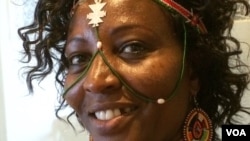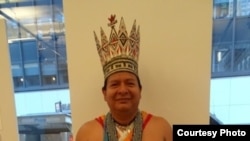The forests that many native peoples call home are more than a means of food, raw materials and other necessities for survival. They are also their source of spiritual connection to the Earth, their ancestors and a meaningful way of life. The leaders of many of the world’s indigenous forest peoples were in New York this week in connection with the first United Nations Climate Summit and the World Conference on Indigenous Peoples.
The forest as sacred provider
Agnes Leina is the founder of Il’laramatak Community Concerns, a grassroots group in a remote region of Kenya dedicated to equality for girls and women in her forest community. With her hands resting gently on the vividly colored patterns of her native dress, she explains that there is a spiritual connection between the animals (both domesticated and wild), her fellow pastoralists and the forests.
“It’s through the forest that young men are initiated into men. And all the sacred trees, the sacred leaves, the sacred gums are actually found in that forest. We naturally use gourds made out of dried wood. Even our cups and bowls! We depend on the forest for everything,” she said.
Leina knows countless traditional songs. But one, about a familiar forest bird, is a special favorite.
“Coo doo loo,” she said, imitating the bird’s calls, then sings. ”It says ‘before it gets dark, please allow me to go home before the cows are brought home.’ Even those words connect us to the forest, and with the animals with the birds and human beings - all interconnected and living at peace with each other,” she explained.
A grandmother’s warning cry
A tall tribal crown, big bare belly and scarlet, orange and blue yarn costume signify Candido Mezua’s role as president of the Embera-Wounaan General Congress. It includes about 10,000 people living in the tropical rainforests of Panama.
Mezua has fought corporate logging most of his life. Through an interpreter, he said that as a teenager, he was inspired by an old woman who approached his group’s campfire one night.
“And the grandmother spoke to us with a very calm voice, but with a crying voice. And even though it was dark and we could not see her eyes, but only listening to her voice, we started to cry also. And the grandmother said, ‘Look at the trees they are cutting down and taking away.' And she said, ‘look, every tree cut down and taken away is a brother of us. Look how many of our brothers have been killed and taken away. So we need to start thinking. What are we going to do? Are we going to be disappear, our brothers, the trees and all the life they carry? Are we going to disappear?’” he recalled.
When your home disappears, so might you
Abdon Nababan, the secretary general of the Indigenous Peoples Alliance of the Archipelago in Indonesia, says that nearly half his community’s forest homeland has disappeared in recent decades, and with it, something of himself.
“Home is a community. It’s where you feel you can talk [about] your story. You can dance. You can eat the meat that you get from the forest. That’s home," he said. "You just feel that you belong to that land. Because you depend on that land. Your identity is the land, forest.” He paused. “That’s the crisis. You will lose yourself, because your identity, the place where you stand, is not there anymore. That’s the situation.”
If attitudes at the U.N. translate into national policies, that situation may change. This week, the United Nations hosted the first World Conference on Indigenous Peoples, a high level plenary session of the General Assembly where over 1,000 delegates were invited to share perspectives on “best practices” to ensure indigenous rights worldwide.








